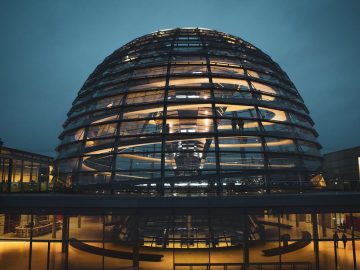The face of Richard Powers, 67, appears on the other side of the screen, smiling. Zoom is essentially the only way one can interview a writer who, for the last decade, has lived in complete solitude and communion with nature, making his home in the Great Smoky Mountains, a subrange of the Appalachians. “I can look out the window and see forest, a mountain ridge,” says the author known for his technological stories and for having a particularly well-tuned radar when it comes to the digital future.
He’s been the winner of countless awards, such as the National Book Award, which he received for his novel The Echo Maker in 2006. In 2019, he won the Pulitzer Prize for Fiction with The Overstory, a publishing phenomenon for which Powers took a half-step away from science fiction to explore environmentalism. Now he’s back with Playground (W.W. Norton & Company), in which he somehow brings together his two obsessions, technological fiction and climate warning. “They are not two different things. Our life here is poised on this fulcrum between these universes, but we integrate them into our own experiences,” he says.
Playground’s plot centers on Todd Keane, a tech magnate who suffers from dementia and reminisces about his childhood, university years and the creation of Playground, a social network with video game elements, essentially a mix of Reddit and Instagram, which brought him fame and wealth. Keane, a creator of potent artificial intelligence tools, recalls people he encountered throughout his life and who, one way or another, have converged on Makatea. The French Polynesian island is in the middle of a referendum on whether it should be used as the base for a consortium of California tech companies set on constructing artificial islands.
Does this sound like science fiction? Next year will mark the 30th anniversary of the publication of Galatea 2.2, a novel in which Powers describes, with terrifying precision, the training of a generative AI’s neuronal network. That is to say: he might live in a cabin, but the author is particularly astute when it comes to predictions as to what the future may bring. “At the time, I was just writing a fairytale. Now, there’s nothing in the book that ChatGPT can’t do many times more,” he says.
He knows what he’s talking about: Powers was a Stanford professor for years, living and working in the heart of Silicon Valley, where he witnessed firsthand the tech revolution. He also got his bachelor’s and master’s degrees from the University of Illinois, where the first graphical web browser would later be invented. “I described in the book the creation of the first internet browser, and that was happening at Illinois when I was there, and there were all the people who would end up going out and creating YouTube and all of these various social networking platforms. I remember thinking about how unprecedented all of this was, how I was living at a moment when human beings were becoming a different kind of creature.”
“I watched those early social networks when they were so primitive, just text on a screen. I could see how it changed the way that people interacted with each other. It created new kinds of hostility and new kinds of anonymous aggression. And then all of sudden, it’s status quo, and now it’s impossible to think of human beings in any other way,” he continues. But he’s not anti-technology, is he? “No, but technology has always created crisis. You can read Socrates saying, be careful about this writing thing, it’s going to cause us to lose our memories, it’s going to make the words of a dead person more important than the person standing right in front of us. We went from Socrates’ anxiety about writing to my anxiety about social networks,” he laughs. “It’s like, if you say yes to writing, the very next day, you’re going to have AI.”
Which begs the question: how does his hermit lifestyle fit into writing highly technological stories? “So I just want to say, I’m not the Unabomber. I’m Zooming with [a journalist who is located in] Spain. I’m not isolated, nobody is isolated! I mean, I can look out the window and see forest, a mountain ridge. I have been sitting in this bedroom when a black bear came up to the window and started scratching its claws on the screen. In one sense, I’m living in the 19th century, but I’m also living every bit as much in the 21st century as everybody else. I can ask, what am I supposed to do when a bear is coming into my house and the AI will tell me what to do, you know?” Which is to return to his main point: the interdependence of the natural and digital ecosystems.
The Appalachians and the real world
Indeed, the same Appalachian mountains now home to Powers also gave birth to Vice President J.D. Vance, whose government has handed over a large amount of power to today’s tech billionaires. Is Powers’ Keane based on a real-life individual? “When I first started writing Playground, I literally thought that I would do an Elon Musk as the central character,” he says. “I got several thousand words of this written, and then I thought, this man is too strange for fiction. I thought, what if we tell a story that tries to understand one of these people in that situation as a human being with human passions, human failings, reasonable and defensible desires?”
It’s not the first time Powers has found inspiration in a real-life figure. 2021’s Bewilderment has a character similar to Donald Trump, “who dismantles democracy by destroying social norms and by basically saying, we’re gonna have new rules now,” Powers says. “What Musk and Trump are doing together goes beyond our worst fears for the future of democracy,” he declares, before performing an astute X-ray on their current political movement. “This oligarchy … Society as a whole knows how dangerous these people are, but the MAGA people somehow believe that this will free them from elites. Even though it’s the most elite of the elites who are doing these things.”
In his new book, a referendum is taking place as to whether an area in the Pacific Ocean will be turned into an island factory. That is to say, it’s a story about voting. But does Powers believe that in the real world, people can opt into technological movements, or are they rather imposed on them? “The problem with opposing the libertarian fantasy that drives Silicon Valley is that it’s more tightly connected to the capitalist fantasy than a lot of these other social ills were. AI represents the complete victory of capital over labor,” he says. “How much say do individuals or collectives or communities have in resisting the forces of history? I mean, how was the first wave of colonialism defeated? How was slavery defeated? How did women get the vote? All of these great social transformations did not emerge from the top. It was the victims of these historical processes who said, no, that’s the end.”
“The problem is the system depends on our own appetites,” he continues. “Each one of us has been so colonized by capitalism that we can’t think of human meaning as being separate from the meaning that the culture of capitalism gives us, which is individualist, commodity-mediated. We don’t know how to think of ourselves in this world except on those terms.” He returns to Fredric Jameson’s famous quote: “It’s easier to imagine the end of the world than the end of capitalism.”
“If you’re on that treadmill, you will never have enough,” Powers says. “But there’s another way of being in the world, and it’s richer and more meaningful and satisfying. The practical question of can we save ourselves is less urgent to me than the question of, how would we save ourselves if we could? You answer the second question first, I think,” he says, sounding optimistic.
“I still want to believe that there’s a way forward for human beings on Earth that doesn’t end in the double catastrophe that capitalism has produced: climate crisis, species extinction,” he continues. “The answer is to start to find a way to tell stories that can light a spark in a reader’s mind, to suggest that for most of human history, there were other kinds of meanings. There is a grand human tradition that says meaning is not in accumulation, it’s in attention. That meaning is not in possessions, it’s in being present. Can’t we tell stories that can create that transformation of consciousness in one reader?” That is precisely Powers’ goal. And he’s making good progress on it.
Sign up for our weekly newsletter to get more English-language news coverage from EL PAÍS USA Edition






